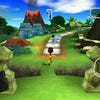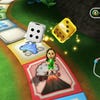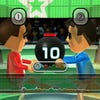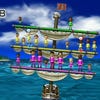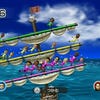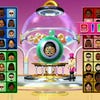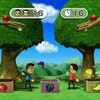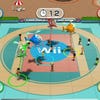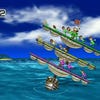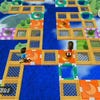Wii Party
Ellie Gibson is away.
So anyway, Beth Orton, Garfield the cat (he just hates Mondays, right?), former Liverpool defender Mark Lawrenson and I were racing around in little buggies, popping balloons the other day. Mark Lawrenson was in the lead for almost the entire game, but then he suffered a terrible bout of engine trouble and started spinning in harmless circles.
That was all Beth Orton needed – with her main competition out of the way, the winsome electro-folk singer leapt into action, finishing the game with an eight-balloon streak. Victory. Still, she blew it all a few minutes later when it turned out she was rubbish at chopping carrots.
For years now, Mario Party titles have leveraged the brand value of the Mushroom Kingdom to entice groups of friends into playing a range of oddball mini-games, strung together across a series of very light competitive campaigns. Wii Party does almost the same thing – almost. The big difference here is that Nintendo's latest uses Miis rather than Mario and Luigi to fill out its cast, meaning that it leverages the brand value of your own family instead. OK, and Mark Lawrenson.
The Mii integration is brilliant in a pantomime sort of way. Wii Party has a lightness of touch when it comes to detailing that makes other games seem a little overwrought. Sure, most of the front end, as with Wii Sports, looks like automatic check-in software for an Air New Zealand flight, but the important elements – the way that Miis jiggle around while dancing and deck themselves out for the various challenges – are enormously charming to watch. The game's also filled with generous touches players might actually need: things like telling you in advance how long any sequence of activities is actually going to last, for example.
Structurally, however, the various options for clumping mini-games together into campaigns is rather patchy. There are plenty of options available, and Wii Party caters for everything four players could want, from five-minute blasts to prolonged hour-long battles. But the frameworks themselves are often pretty uninspired.
Party Games are the main event. Ranging from the simple race to the finish line of Board Game Island to Globe Trot's round-the-world photo hunt, they're available for one to four players and present an obligingly colourful suite of activities.
Often, though, they're riddled with odd design choices. Board Game Island has a bad case of Blue Shell Syndrome, sending players in the lead straight to the back of the pack and generally reversing people's fortunes a little too often via special tiles. It's presumably implemented to make the whole thing appear competitive right until the end, but it actually feels random and faintly vindictive.
Globe Trot, meanwhile, has a wrap-around board that can be hard to read, and navigation and rules sufficiently complex to erode any kind of strategy. OK, it's hardly Civilisation, but it's significantly more fiddly than it should be.
Rounding off the Party Games are Spin-Off, a wheel-based game show, and Bingo – both of which are pleasant enough even though they're a bit stingy with the mini-games – and Mii of a Kind, a match-the-Miis game which actually gets rather tense, especially if I'm playing with my brother who, it turns out, is a git.


